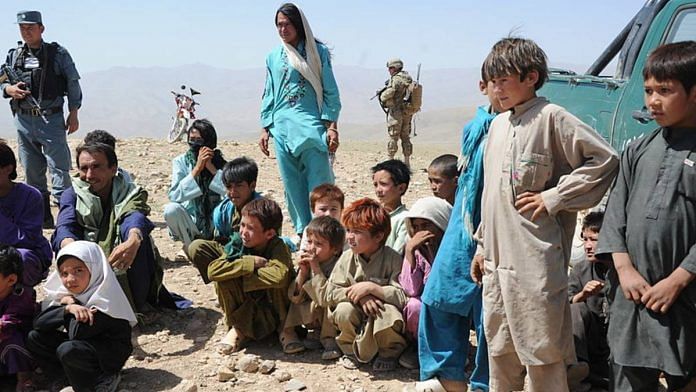New Delhi: The Taliban has forcibly evicted the minority Hazara Shia communities and people associated with the former government in several provinces across Afghanistan to distribute land to their own supporters, a report by Human Rights Watch, a New York-based NGO has said.
This, the report said, was a form of a “collective punishment” for the minority group as well as officials of the former government of Afghanistan.
According to the report, it was in early October when the Taliban and associated militias forced hundreds of Hazara families to leave their homes and farms from the southern Helmand province and the northern Balkh province.
The families were also evicted from areas of Daikundi, Uruzgan, and Kandahar provinces and, in many cases, with only a few days’ notice and without any opportunity to present their legal claims to the land, the report said.
The report also quoted a former United Nations political analyst who said that he saw eviction notices telling residents that if they did not comply, they “had no right to complain about the consequences”.
According to Patricia Gossman, associate Asia director at Human Rights Watch, the Taliban forcibly evicted Hazaras and others based on ethnicity or political opinion to reward Taliban supporters.
“These evictions, carried out with threats of force and without any legal process, are serious abuses that amount to collective punishment,” she was quoted as saying in the report.
According to the report, international law prohibits forced evictions, defined as the permanent or temporary removal of individuals, families, or communities against their will from their homes or land, without access to appropriate forms of legal or other protection.
The Hazaras are a predominantly Shia Muslim ethnic group that has been subjected to repeated persecution and torture by the Taliban in the past.
“They have faced discrimination and abuse by successive Afghan governments going back over 100 years,” the report said.
‘Armed men driving families out’
According to the report, it was also reported in the media that that armed men from the local Kushani community were working with local Taliban security forces to force families from Mazar-e Sharif’s Qubat al-Islam district in Balkh province to leave.
The report said while the Taliban officials claimed that the evictions were based on a court order, evicted residents asserted that they have owned the land since the 1970s.
Also read: What does the Taliban’s takeover of Afghanistan mean for the future of Afghan migrants?
‘Taliban issued letters to 400 families’
The report quoted residents of Naw Mish district in Helmand province as saying that the Taliban issued a letter to at least 400 families in late September ordering them to leave.
“Given little time, the families were unable to take their belongings or complete harvesting their crops. One resident said the Taliban detained six men who tried to challenge the order; four remain in custody,” the report said.
Another resident was quoted as saying that in the early 1990s, local officials “distributed large tracts of land among their relatives and supporters, exacerbating tensions between ethnic and tribal communities”.
An activist from Helmand was quoted as saying that the property is being redistributed to the Taliban members holding official positions.
They “are cannibalizing land and other public goods” and redistributing it to their own forces,” the HRW report quoted the activist as saying.
Largest displacement in 15 villages
According to the report, the largest displacements have taken place in 15 villages in Daikundi and Uruzgan provinces, where the Taliban evicted at least 2,800 Hazara residents in September.
“The families relocated to other districts, leaving their belongings and crops behind,” the report said.
The report also quoted a former resident saying that after the Taliban takeover, they received a letter from the Taliban informing them that they should leave their houses because the lands are in dispute.
The resident also told HRW that the Taliban had established checkpoints on the roads out of the villages and “did not let anyone take even their crops with them.”
According to the report, following media coverage of the evictions, the Taliban officials in Kabul retracted eviction orders for some Daikundi villages, but as of 20 October, no residents had returned.
The report further said that in Kandahar province in mid-September, the Taliban gave residents of a government-owned residential complex three days to leave. The property had been distributed by the previous government to civil servants, the report said.
(Edited by Neha Mahajan)
Also read: India ready to send aid to Taliban-ruled Afghanistan but how to route it is the question



